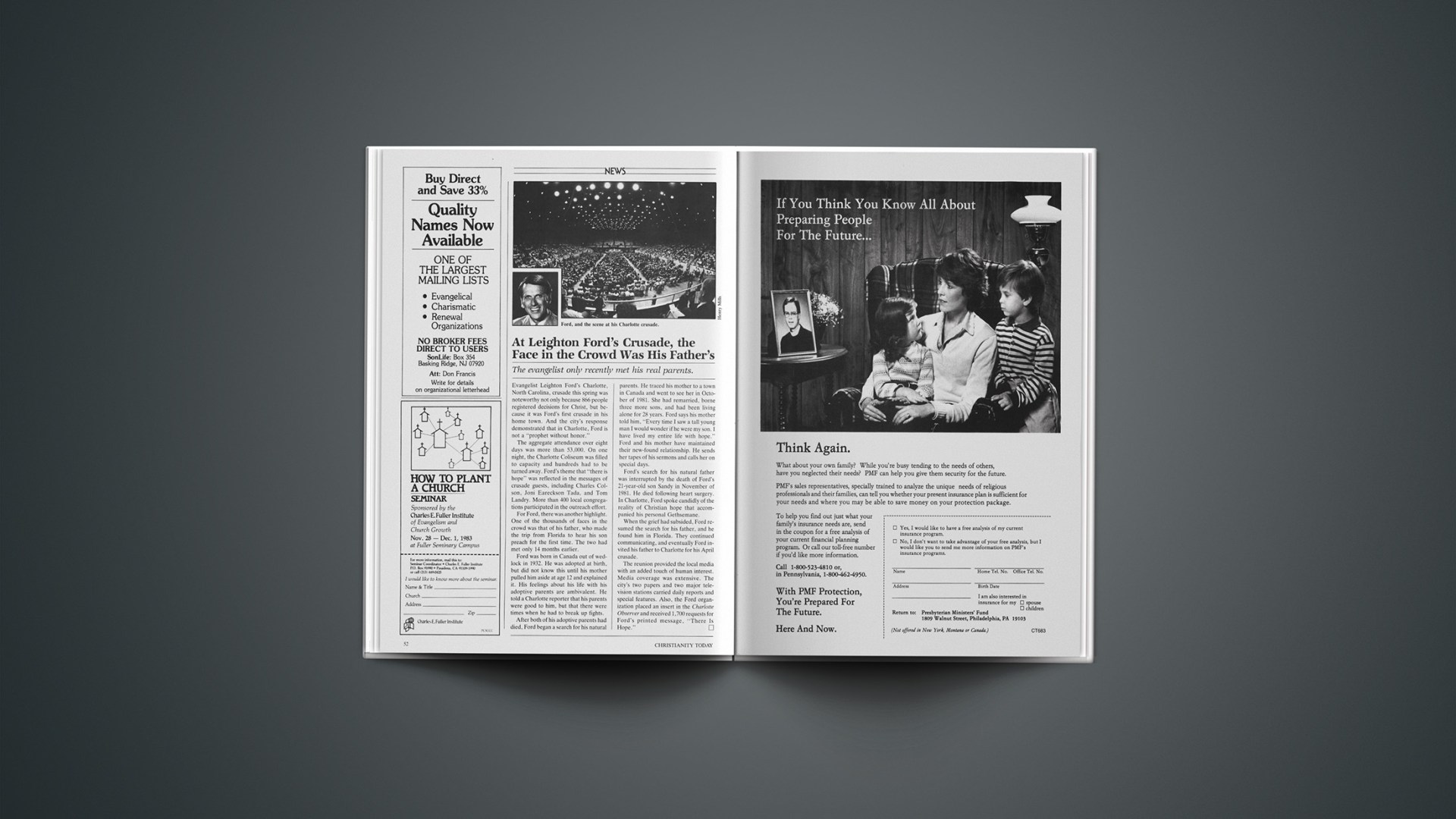The evangelist only recently met his real parents.
Evangelist Leighton Ford’s Charlotte, North Carolina, crusade this spring was noteworthy not only because 866 people registered decisions for Christ, but because it was Ford’s first crusade in his home town. And the city’s response demonstrated that in Charlotte, Ford is not a “prophet without honor.”
The aggregate attendance over eight days was more than 53,000. On one night, the Charlotte Coliseum was filled to capacity and hundreds had to be turned away. Ford’s theme that “there is hope” was reflected in the messages of crusade guests, including Charles Colson, Joni Eareckson Tada, and Tom Landry. More than 400 local congregations participated in the outreach effort.
For Ford, there was another highlight. One of the thousands of faces in the crowd was that of his father, who made the trip from Florida to hear his son preach for the first time. The two had met only 14 months earlier.
Ford was born in Canada out of wedlock in 1932. He was adopted at birth, but did not know this until his mother pulled him aside at age 12 and explained it. His feelings about his life with his adoptive parents are ambivalent. He told a Charlotte reporter that his parents were good to him, but that there were times when he had to break up fights.
After both of his adoptive parents had died. Ford began a search for his natural parents. He traced his mother to a town in Canada and went to see her in October of 1981. She had remarried, borne three more sons, and had been living alone for 28 years. Ford says his mother told him, “Every time I saw a tall young man I would wonder if he were my son. I have lived my entire life with hope.” Ford and his mother have maintained their new-found relationship. He sends her tapes of his sermons and calls her on special days.
Ford’s search for his natural father was interrupted by the death of Ford’s 21-year-old son Sandy in November of 1981. He died following heart surgery. In Charlotte, Ford spoke candidly of the reality of Christian hope that accompanied his personal Gethsemane.
When the grief had subsided, Ford resumed the search for his father, and he found him in Florida. They continued communicating, and eventually Ford invited his father to Charlotte for his April crusade.
The reunion provided the local media with an added touch of human interest. Media coverage was extensive. The city’s two papers and two major television stations carried daily reports and special features. Also, the Ford organization placed an insert in the Charlotte Observer and received 1,700 requests for Ford’s printed message, “There Is Hope.”
An Egyptian administrative court upheld the ouster of Pope Shenouda III from the Coptic Orthodox Church leadership, but struck down the section of the 1981 decree that replaced him with a five-bishop committee. The April court action is being seen as a move to force the church to elect a new pope, effectively removing Shenouda, whose confrontational stance aroused former President Anwar Sadat. But some Copts protest that under President Hosni Mubarak the government is interfering in internal church affairs to a degree Sadat never attempted.
Chinese authorities arrested a Guangzhou (Canton) pastor last month for holding church meetings in his home and entertaining foreigners. Lin Xiangao had been imprisoned for years and then released in 1979. The authorities said his activities were a violation of restrictions for a five-year parole period.
How does separation of synagogue and state play in Israel? According to a recent poll reported in the Israeli press, 57 percent of Israelis would like to see religious studies in state schools expanded, while only 6 percent would opt for a reduction. And, as a result of a reorganization in the Ministry of Religious Affairs, more than 250 Muslim clergymen will go onto the state payroll. They will be remunerated for conducting weddings and dealing with village religious affairs.
Iranian authorities are continuing a drive to decimate Bahais (followers of an offshoot of Islam considered heretical), according to reports reaching the U.S. State Department. Three were hanged in April, and 19 others were sentenced this spring. Nearly 400 Bahais are believed to be in prison in Iran, and about 4,000 are said to be “internal refugees” and in hiding. About half the Bahai children of school age—25,000 to 30,000—are reported banned from school attendance, and most of those permitted to attend are mistreated.
Ninety percent of the French population no longer believe in sin, and only 4 percent accept the concept, according to a recent survey. Also, in a country where 82 percent consider themselves to be Catholic, 69 percent said they never went to confession and 13 percent said they confessed to a priest once a year or less often. The survey results were published in the Catholic weekly Le Pelerin.
Three Christian institutions will begin the 1983–84 academic year with new presidents. George W. Peck has been selected president of Andover Newton Theological School. Thomas W. Gillespie succeeds James McCord as president of Princeton Theological Seminary. Finally, DeWitt C. Baldwin will be the new president of Earlham College.
T. Patrick Arnold has been elected president of the missions agency Worldteam. He succeeds J. Allen Thompson. Arnold, since joining the mission in 1943, has served as personnel director, area director, and vice-president for administration and finance.
Norman S. Marshall has been named national commander of the Salvation Army in the United States. Marshall, who had been commander of the eastern territory, succeeds John D. Needham, who died April 13.










